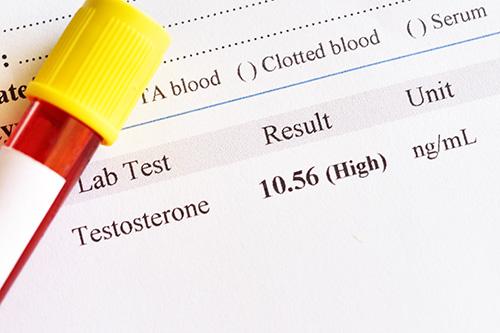Why you should get a PSA test
Published
The benefits of taking a PSA test
- Understand your risk of prostate cancer now
- Understand your risk of developing prostate cancer in the future
- Pick up prostate cancer before it has spread
- Reduce the risk of dying from prostate cancer
Prostate cancer is the commonest cancer in men affecting 1-in-8 or 12.5% of men during their lifetime. Despite this, you might be surprised to learn that there’s no formal screening programme for prostate cancer in the UK. Current NHS policy is that men over 50 can ask their GP for a prostate-specific antigen (PSA) test to understand their risk of prostate cancer but doctors are not encouraged to actively offer PSA testing to their patients.
However, this NHS guidance is based on outdated clinical trial data that tested old-fashioned pathways of prostate cancer diagnosis and treatment that are no longer used. Prostate Cancer UK recently challenged the NHS position on PSA testing in an expert consensus statement published in 20241.
So let’s understand what’s changed and why every man should consider getting a PSA test. We’ll start by reminding you what a PSA test is.
What is a PSA test?
Prostate-specific antigen, or PSA, is a protein produced by the prostate gland as part of semen. Some PSA naturally “leaks” out of the prostate gland and can be measured in the blood with a PSA blood test.
The amount of PSA produced by the prostate is related to the size of the prostate gland. A bigger prostate produces more PSA. A higher PSA level can also be caused by something “disturbing” the prostate. For example, ejaculation or vigorous exercise (particularly cycling) can cause more PSA to leak into the blood.
Prostate cancer can also disturb the prostate gland and cause the PSA level to go up.
All this means that a high PSA level can sometimes be a sign of prostate cancer, but it can also just be a sign of a big prostate gland (which happens naturally as men get older) or that something else has disturbed the prostate.
What are the benefits of taking a PSA test?
1. Understand your risk of having prostate cancer now
The aim of the PSA test is not to diagnose prostate cancer; it's to tell you if you're at higher risk of having prostate cancer.
Hopefully you can appreciate that having a high PSA level means that you have a higher risk of having prostate cancer but it does not mean that you actually have prostate cancer. This is the crucial point to understand about PSA testing that some people get confused about.
The aim of the PSA test is not to diagnose prostate cancer.The benefit of a PSA test is that it can tell you if you’re at higher risk of having prostate cancer.
Knowing that you’re at higher risk of having prostate cancer is important because then you know that it’s worth using other tests to see if you actually have the condition. Nowadays, if you have a high PSA level we can use an MRI scan of the prostate to see if there’s anything suspicious in the gland.
Only if the MRI scan shows something abnormal would someone go on to have a biopsy of the prostate to actually make the diagnosis. This significantly reduces the risk of performing unnecessary prostate biopsies and is a major change from the early trials of PSA testing which did not use MRI scanning.
2. Understand your risk of developing prostate cancer in the future
You might think that taking a PSA test is only helpful in telling you about your risk of having prostate cancer now. But actually, one of its main benefits is telling you about your risk of developing prostate cancer in the future, so you can judge how often to screen and how to interpret future results.
Studies show that having a higher PSA level before the age of 50, even within the normal range, means that you have a higher than average risk of developing prostate cancer in the future2, 3, 4.
3. Pick up prostate cancer before it has spread
Men who undergo regular PSA screening are 40% less likely to be diagnosed with prostate cancer that has spread.
Prostate cancer doesn’t generally cause symptoms until it’s quite large, by which point it’s more likely to have spread to other parts of your body, making it very difficult to cure.
PSA levels actually start to go up before men notice any symptoms. The majority of prostate cancers are actually picked up because of a high PSA level and studies have shown that you’re more likely to pick up prostate cancer if you regularly check your PSA level5.
Even better, trials have shown that men who undergo regular PSA screening are 40% less likely to be diagnosed with prostate cancer that has spread to other parts of the body than men who don’t undergo screening5.
4. Reduced risk of dying from prostate cancer
Ultimately, the main aim of PSA testing is to reduce the risk of dying from prostate cancer. Trials have shown that regular PSA testing reduces the risk of dying from prostate cancer by 20-30%5, 6.
How can you use a PSA test to keep on track with your health?
Remember, a PSA blood test tells you about your risk of having prostate cancer, now or in the future. It does not diagnose prostate cancer. You use a PSA test as just one part of your prostate cancer detection strategy.
1. Understand if you’re at high risk of prostate cancer
Some groups of men are at higher risk of prostate cancer than others. You’re at higher risk of developing prostate cancer in your lifetime if you:
- are of black ethnicity
- have a family history of prostate, ovarian or breast cancer
2. Take a baseline PSA test to guide future PSA testing
The National Comprehensive Cancer Network in the USA recommends that men first take a PSA test at 45 (or 40 if considered high risk by the criteria above) to gauge their future prostate cancer risk and guide ongoing screening7.
If your baseline PSA level is under 1µg/L then guidelines recommend repeating your PSA blood test every 2 to 3 years.
On the other hand, if your baseline PSA level is 1µg/L or more then you should check your PSA level every year.
3. Check your PSA velocity
Around 1-in-7 men can have a normal PSA level but still have prostate cancer. For this reason, we don’t just pay attention to that absolute PSA value, we also need to look at how your level changes over time. This is called the PSA velocity.
Whenever you repeat your PSA test you can compare it to your previous level and calculate your PSA velocity (we do this for you automatically if you test with us). It’s normal for PSA to increase slowly as you get older but a rapid increase can be a sign of prostate cancer, even if the absolute level is within the normal range. A PSA velocity over 0.75μg/L per year is considered suspicious8.
4. Use MRI to check the prostate if your PSA level is high
If you take a PSA test and your level is high for your age then in most cases you should see a specialist (a urologist) and have a scan of your prostate to look for signs of prostate cancer. No one should have a biopsy of the prostate without having an MRI scan first. This is crucial to reduce the risk of undergoing an unnecessary biopsy.
The level of PSA considered “high” in the UK depends on your age:
| Age | High PSA level (μg/L) |
| 40 to 49 | 2.5 |
| 50 to 69 | 3 |
| 70 and over | 5 |
However, we would recommend that anyone with a PSA level over 3μg/L discuss their level with their GP.
Summary
We’ve come a long way since the original guidance on the use of PSA testing to screen for prostate cancer. The introduction of MRI has significantly reduced the risk of unnecessary biopsy and we have a much better understanding of which prostate cancers are low risk and can be safely monitored without treatment. For those men surgery, the use of keyhole surgery and robotics has significantly reduced the risk of complications.
Taking a PSA test should be an integral part of a man’s approach to managing their prostate health and the UK is lagging behind other countries, such as the USA, in this regard. But it’s important to understand how to use PSA testing correctly and that it’s only one part of a suite of tools to pick up prostate cancer early and reduce the risk of prostate cancer death.
Check your PSA levels today with a simple at home blood test.
Get tips on better health
Sign up to our emails on the better way to better health.
We'll keep you up-to-date with the latest research, expert articles and new ways to get more years of better health.






